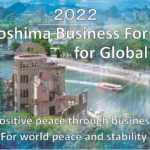Results of the “2022 Hiroshima Business Forum for Global Peace”
Positive peace through business―For world peace and stability-
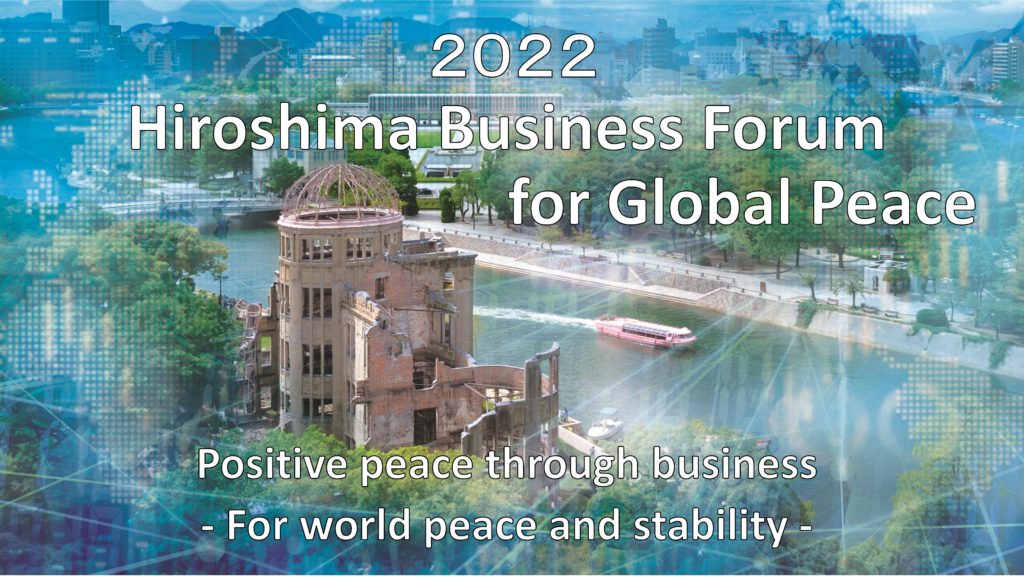
Hiroshima Business Forum for Global Peace
The forum aims to contribute to the realization of a truly peaceful and sustainable global community by serving as a business platform where participants reaffirm and share with each other the importance of world peace, review the roles of entities such as businesses and NGOs, and multilaterally discuss the relationship between business and ways of promoting peace.
The World Business Conference for World Peace was initially in 2013 and it was renamed to the Hiroshima Business Forum for Global Peace in 2020(75 years since the atomic bombing ) to make a new start, and the 2021 forum was the 7th forum of its kind.
Date: September 8 (Thu), 2022
Organization: Hiroshima Organization for Global Peace (HOPe)
Venue: International Conference Center Hiroshima
Held in Hybrid(Online and On-Site)
【Opening and special talk 】
- Triggered by the war in Ukraine, the postwar system of
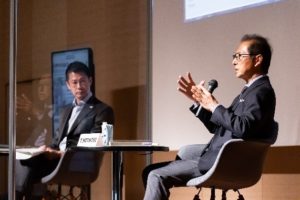 industrialization, globalization, and capitalism compounded by democracy has been coming open at the seams in areas such as energy, food, and natural disaster preparedness. Experts, business people, government officials, and others in various positions are sharing their wisdom on how to reduce the risk of threats to peace, and subsequent wars.
industrialization, globalization, and capitalism compounded by democracy has been coming open at the seams in areas such as energy, food, and natural disaster preparedness. Experts, business people, government officials, and others in various positions are sharing their wisdom on how to reduce the risk of threats to peace, and subsequent wars. - There are three key words that embody what businesses can do:
(1) Innovation, (2) Information, especially in response to the fragmentation brought about by the age of the internet, and (3) Distribution in the broadest sense—especially investment in human capital.
・Innovation: Expansion of business scale does not necessarily lead to higher productivity. Technology will make it possible to control the scale of business in a decentralized and manner more appropriate than simply uniformly scaling it up.
・Information: How can businesses that transmit information accurately convey information, remove information that is intentionally misleading, and ensure information literacy of the recipients?
・Distribution (personnel development): It is necessary not only to protect the framework for long-term employment, but also to help those who are willing to learn new skills so that they will have the ability to earn money even if the world changes.
| MITACHI Takashi | Professor Graduate School of Management, Kyoto University |
| YUZAKI Hidehiko | Governor Hiroshima Prefecture |
【Session 1】” Stable energy supply in the era of economic security and the SDGs “
- Climate change is a life-threatening issue. Companies must
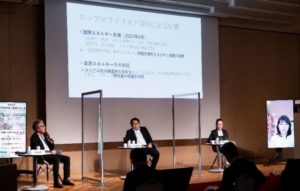 work on decarbonization for the sake of corporate value and competitiveness in the midst of changing markets and investment flows. As for the energy mix, Japan has potential in wind power and other forms of renewable energy, and the potential of renewable energy should be pursued. However, it is also necessary to deal with the issue of nuclear power, including on the demand side.
work on decarbonization for the sake of corporate value and competitiveness in the midst of changing markets and investment flows. As for the energy mix, Japan has potential in wind power and other forms of renewable energy, and the potential of renewable energy should be pursued. However, it is also necessary to deal with the issue of nuclear power, including on the demand side. - In all regions of the world, the importance of balancing safety, economy, stable supply, and environmental compatibility is increasing more than ever before. It is necessary to aim for a sustainable transition to decarbonization in a multilayered scenario while carefully considering the current economic and social burdens.
- It is necessary not only to reduce CO2 emissions, but also to make people feel that green transformation creates a large amount of added value. We need to create industrial and technological services for this purpose.
| KAJI Yoshimitsu(Moderator) | Chairman & CSDO (Chief Sustainable Development Officer), Cinnamon AI (Cinnamon Inc.),Lumada Innovation Hub Senior Principal, Hitachi, Ltd. Kamakura Smart City Architect |
| TAKEUCHI Sumiko | Director of the International Environment and Economy Institute, specially appointed Visiting Professor at Tohoku University, and Joint Representative Director at U3Innovations LLC |
| MATSUO Go | Energy Economics and Society Research Institute LLC – Managing Director |
| MIYAKE Kahori | Co-Chairs, Japan Climate Leaders’ Partnership Director, ESG Planning and Promotion Department, Sumitomo Mitsui Trust Bank, Limited |
【Session 2】” Human resources development to secure innovation-based economic growth and employment in the midst of global economic instability “
- It is necessary to create an employment environment that
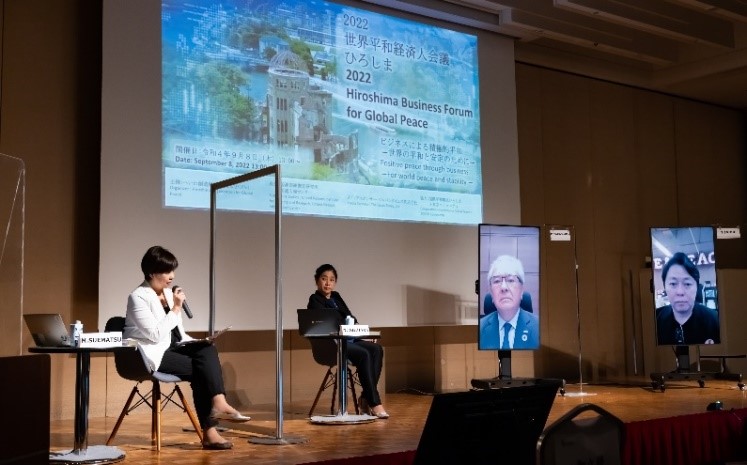 leads to the development of innovative personnel through cooperation among industry, government, and academia. For example, if a system is created to promote the acceptance of employees from the “employment ice age” and refugees by offering tax benefits if they meet a set employment rate, companies will actively adopt diversity and tolerance, which will lead to the development of innovative personnel capable of creative work.
leads to the development of innovative personnel through cooperation among industry, government, and academia. For example, if a system is created to promote the acceptance of employees from the “employment ice age” and refugees by offering tax benefits if they meet a set employment rate, companies will actively adopt diversity and tolerance, which will lead to the development of innovative personnel capable of creative work. - By supporting innovation not only within the company, but also in various other forms, such as open innovation in collaboration with start-ups and other external organizations, we can promote innovation, which will lead to solutions to social issues.
- However, if there is psychological safety that allows companies to take failure as an experience and take on new challenges, it will be possible to continue business operations while responding to social changes—in other words, to continue employing people.
| SUEMATSU Minako(Moderator) | Chairperson, Publisher and President The Japan Times, Ltd. |
| ISHIHARA Naoko | ExaWizards Inc. Hataraku AI & DX Institute. Director |
| INOUE Takashi | President and CEO, LIFULL Co.,Ltd., Representative Director, Next Wisdom Foundation,Representative Director, PEACE DAY Foundation,Representative Director, Nasucon Valley Council,Councilor,Well-being for Planet Earth Foundation,Director,Japan Association of New Economy |
| TAKASHIMA Makoto | President and CEO, Sumitomo Mitsui Banking Corporation |
【Closing】
- How proactively can a business prepare for risk and
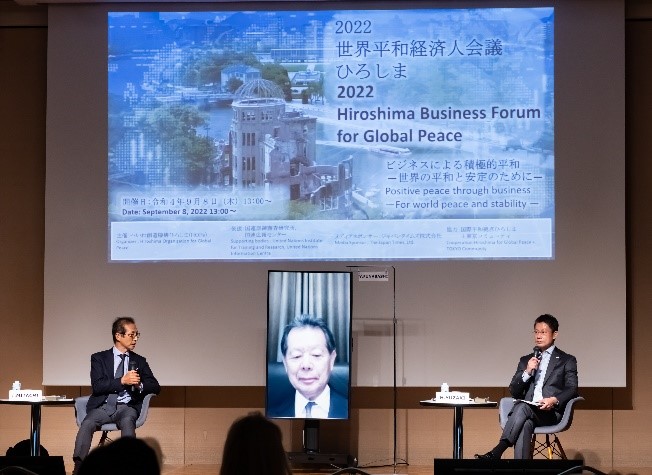 environmental changes? This ability leads to prosperity and strength, which in turn leads to stability and peace. The situation in Ukraine has also reminded us that business is possible only when there is peace. It is important to determine what we can do to actively promote peace.
environmental changes? This ability leads to prosperity and strength, which in turn leads to stability and peace. The situation in Ukraine has also reminded us that business is possible only when there is peace. It is important to determine what we can do to actively promote peace. - It is important for businesses not only to wait for someone else to make rules, but also to actively engage in discussions and contribute to rule making. This leads to risk avoidance. Innovation is essential for rule making.
- It is important to establish tangible standards on how to act in the next era in a situation where the existing norms are shaken. The G7 can lead the way. It would be great if something impactful could be done by the Hiroshima Summit that will be held in 2023, as well as the 80th anniversary of the end of World War II, which will be celebrated in 2025.
- We should reach out to global business leaders and aim to send out a broad message about peace from Hiroshima from a global perspective, that touches upon our response to climate change, refugees, and conflicts over natural resources.
| FUNABASHI Yoichi | Chairman, Global Council, The International House of Japan |
| MITACHI Takashi | Professor Graduate School of Management, Kyoto University |
| YUZAKI Hidehiko | Governor Hiroshima Prefecture |
Previous Conferences
2021Hiroshima Business Forum for Global Peace (September, 2021)
2020Hiroshima Business Forum for Global Peace (August, 2020)
2019 World Business Conference for World Peace (October, 2019)
2018 World Business Conference for World Peac (November, 2018)
2016 World Business Conference for World Peace (October, 2016)
Inquiries about this page
Hiroshima Organization for Global Peace (Hiroshima Prefectural Office)
Street address:10-52, Motomachi, Naka-ku, Hiroshima-shi, Hiroshima-ken, 730-8511
Tel:+81-(0)82-228-2111
Tags associated with this article




